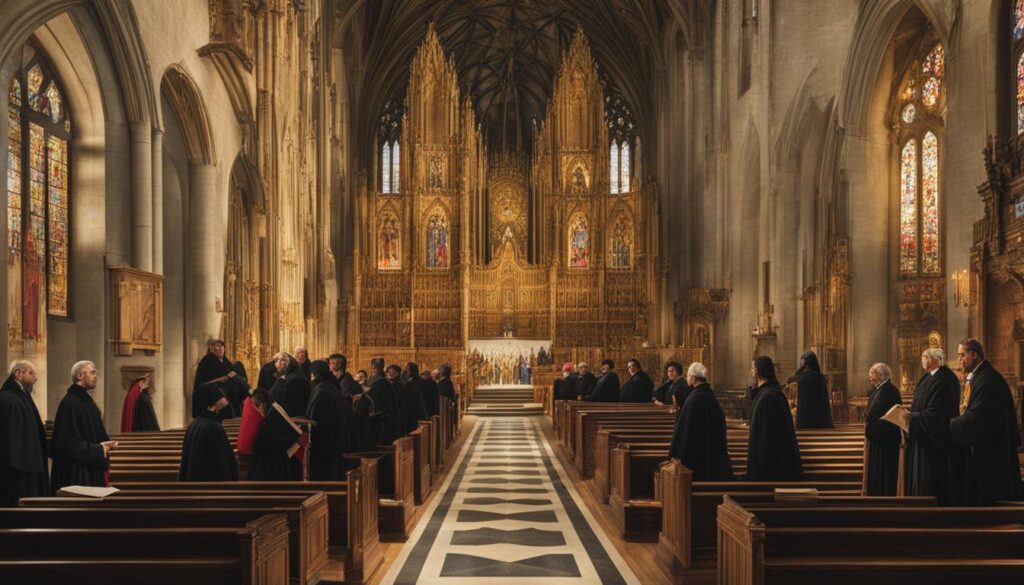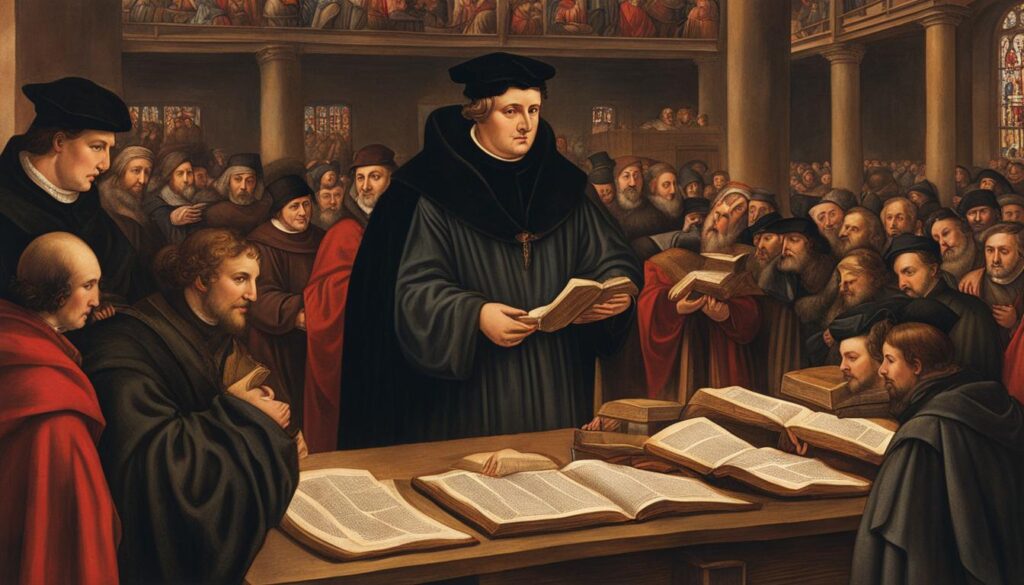Protestantism and Lutheranism are two terms often used interchangeably, leading to confusion among many people. While Protestants and Lutherans share a common Christian faith, there are important distinctions between them. In this article, we will explore the history, beliefs, and practices of Lutheranism to gain a better understanding of this branch of Protestantism.
Lutheranism, a major branch of Protestantism, traces its origins back to Martin Luther, the German monk and reformer who played a pivotal role in the Protestant Reformation during the 16th century. Lutheranism emerged as a response to the Catholic Church’s practices and doctrine at that time.
Unlike other Protestant denominations, Lutheranism places a strong emphasis on the doctrine of justification by grace alone through faith alone on the basis of Scripture alone. This belief, known as sola fide, stands in contrast to the teachings of the Roman Catholic Church.
Key Takeaways:
- Lutheranism is a branch of Protestantism, founded by Martin Luther during the 16th century.
- Lutherans hold a strong belief in justification by grace alone through faith alone.
- Protestants and Lutherans share a common Christian faith but have distinct theological differences.
- Lutherans have their own set of beliefs, practices, and organizational structures.
- Understanding Lutheranism can provide insights into the history and diversity of Protestantism.
The History of Lutheranism
Lutheranism traces its roots back to the teachings of Martin Luther, a 16th-century German monk and reformer. Lutheranism emerged during the Protestant Reformation, a movement that sought to reform the Catholic Church. Martin Luther’s writings and actions, such as his famous Ninety-Five Theses, challenged the authority of the church and sparked a theological and spiritual revolution.
As Lutheranism gained popularity, it spread throughout northern Europe, becoming the state religion of many countries. It reached countries such as Scandinavia, Estonia, Latvia, Lithuania, and even America. The first Lutheran church in America was established in Delaware in the 17th century, marking the beginning of Lutheranism’s presence in the New World.
Today, Lutheranism has a significant global presence, with an estimated 80 million members worldwide. It has played a crucial role in shaping Christianity and has left a lasting impact on the religious landscape. Lutherans continue to uphold the teachings of Martin Luther and the principles of the Lutheran faith.
Key Points:
- Lutheranism originated from the teachings of Martin Luther during the Protestant Reformation.
- It spread throughout northern Europe and became the state religion in many countries.
- The first Lutheran church in America was established in Delaware in the 17th century.
- Lutheranism has a global presence with approximately 80 million members worldwide.
Distinctions between Lutheranism and Protestantism

When it comes to understanding the differences between Protestants and Lutherans, it is essential to delve into their theological beliefs. While both fall under the umbrella of Protestantism, Lutheranism has distinct characteristics that set it apart from other branches. Here are some key distinctions:
Liturgical Practices and Sacramental Teachings
Lutheranism retains many of the liturgical practices and sacramental teachings of the pre-Reformation Catholic Church. Lutherans place a strong emphasis on the Eucharist, also known as the Lord’s Supper. They believe in the real presence of Christ in the bread and wine, a concept known as sacramental union. This belief sets Lutheranism apart from other Protestant denominations that may have a symbolic or metaphorical understanding of communion.
Doctrine of Justification and Good Works
Lutherans have a different perspective on the doctrine of justification and the role of good works in salvation compared to other Protestants. Lutheranism teaches that salvation is achieved by grace alone through faith alone on the basis of Scripture alone. Good works are seen as a response to God’s grace but are not considered a means of earning salvation. This stands in contrast to some Protestant denominations that place a greater emphasis on the role of good works in the process of salvation.
Denominational Diversity
While Lutheranism is a distinct branch of Protestantism, it is important to note that there is denominational diversity within the Lutheran faith. Different Lutheran denominations may have varying beliefs and practices, although they all trace their heritage back to the teachings of Martin Luther. Examples of Lutheran denominations include the Lutheran Church—Missouri Synod (LCMS) and the Evangelical Lutheran Church of America (ELCA). These denominations may differ in their theology, worship practices, and stance on social issues.
Understanding these distinctions between Lutheranism and other branches of Protestantism can provide valuable insights into the unique beliefs and practices of Lutherans. While there may be similarities, these differences contribute to the rich tapestry of Christian faith and worship.
Lutheran Beliefs and Practices

Lutheranism is a distinctive denomination within Protestantism, characterized by its unique set of beliefs and practices. Here are some key aspects of Lutheran theology, sacraments, and worship:
Lutheran Denomination
Lutheranism is a major denomination within Protestant Christianity, with millions of followers worldwide. It traces its origins back to Martin Luther and his reformist teachings in the 16th century. Lutheranism is diverse, with different Lutheran churches and synods having their own distinct identities and practices.
Lutheran Theology
Central to Lutheran theology is the belief in salvation by grace alone through faith alone. Lutherans emphasize the authority of Scripture as the sole source of religious doctrine. They hold a strong belief in the doctrine of justification by faith, which teaches that humans are saved from sin and granted eternal life through faith in Jesus Christ.
Sacraments and Worship
Lutherans recognize two sacraments: baptism and the Lord’s Supper (communion). They view baptism as a means of grace and an important rite of initiation into the Christian faith. The Lord’s Supper, also known as the Eucharist or Holy Communion, holds a central place in Lutheran worship. Lutherans believe in the real presence of Christ in the bread and wine, which they receive as a spiritual nourishment.
Lutheran worship services often follow a liturgical structure, combining prayers, hymns, Scripture readings, and sermons. The liturgy typically includes elements such as the Invocation, Confession and Absolution, Lord’s Prayer, and Benediction. Music, especially hymns, plays a significant role in Lutheran worship, reflecting the rich musical heritage of the denomination.
Overall, the Lutheran faith encompasses a distinct set of beliefs and practices, centered around grace, faith, and the sacraments. Understanding these aspects provides valuable insights into the theology and worship of Lutheranism.
Lutheran Organizations and Synods

Lutheranism is a diverse and organized Christian denomination with various synods and organizations that help govern and guide its churches. These synods serve as regional or national bodies that coordinate the efforts of individual Lutheran congregations and provide support and resources to their members.
Examples of prominent Lutheran synods include the Lutheran Church—Missouri Synod (LCMS) and the Evangelical Lutheran Church in America (ELCA) in the United States. The LCMS is known for its conservative theological stance and adherence to traditional Lutheran doctrine, while the ELCA takes a more progressive approach to theology and social issues.
These synods play a crucial role in the governance and administration of Lutheran churches, overseeing matters such as ordination, pastoral assignments, and doctrinal disputes. They provide a platform for collaboration and communication among congregations and ensure a unified approach to key decisions within the Lutheran faith.
Key Functions of Lutheran Synods:
- Providing guidance and support to member congregations
- Facilitating ordination and placement of pastors
- Developing and implementing theological positions and social statements
- Organizing and supporting missions and outreach efforts
- Administering educational programs and resources
Through the structure and organization provided by synods, Lutheran churches remain connected and unified in their theological beliefs and practices while also adapting to local and regional contexts. This organizational framework allows for a collaborative and coordinated approach to spreading the teachings and values of Lutheranism.
Lutheran Contributions and Figures

Lutheranism, with its rich history, has produced significant figures and contributions that have shaped the Christian faith. Two prominent figures in Lutheran history are Martin Luther and Philip Melanchthon. Martin Luther, a German monk and theologian, played a crucial role in initiating the Reformation by challenging the teachings and practices of the Roman Catholic Church. His writings, including the 95 Theses, sparked a theological and social movement that resulted in the establishment of the Lutheran Church and the spread of Protestantism.
Philip Melanchthon, a close collaborator of Luther, was an influential theologian and scholar. He is particularly known for his authorship of the Augsburg Confession, a significant document that outlined the theological beliefs of Lutheranism. The Augsburg Confession, presented to Emperor Charles V in 1530, highlighted the key doctrines of the Lutheran faith and sought to clarify the differences between Lutheranism and Catholicism. It remains a central confession of faith for Lutherans worldwide.
Through their writings and teachings, Martin Luther and Philip Melanchthon laid the foundation for the Lutheran faith and contributed to the development of Protestant theology. Their impact continues to resonate within the Lutheran community and beyond, inspiring believers and scholars alike.
Key Contributions of Lutheranism:
- Establishment of Lutheran churches globally through missionary efforts
- Promotion of the authority of Scripture and justification by grace through faith
- Emphasis on education and the translation of the Bible into the vernacular
- Advocacy for religious freedom and the priesthood of all believers
- Contributions to hymnody, with the development of congregational singing
- Development of confessional writings, including the Book of Concord
Global Presence and Denominational Diversity

Lutheranism has a strong global presence, with approximately 80 million members worldwide. This Christian denomination has spread to various countries through missionary efforts and continues to have a significant impact on the global religious landscape. Lutheranism is not limited to any specific region or continent; its followers can be found in diverse locations all around the world.
One of the remarkable aspects of Lutheranism is the denominational diversity within the faith. While there are common beliefs and practices that unite Lutherans, there are also variations and distinct denominations within the larger Lutheran tradition. Different Lutheran denominations may have varying theological perspectives, worship styles, and organizational structures.
Two of the main Lutheran bodies in the United States are the Lutheran Church—Missouri Synod (LCMS) and the Evangelical Lutheran Church of America (ELCA). These denominations have unique characteristics and theological stances, catering to different groups of believers. Other countries also have their own independent Lutheran synods, each with its own specific traditions and practices.
Lutheran Denominations:
- Lutheran Church—Missouri Synod (LCMS)
- Evangelical Lutheran Church of America (ELCA)
- Church of Sweden
- Evangelical Lutheran Church in Tanzania
- Church of Norway
- Evangelical Lutheran Church in America (ELCA)
- Church of Denmark
Despite the denominational diversity, all Lutheran churches share a common heritage rooted in the teachings of Martin Luther and the principles of the Protestant Reformation. Regardless of the specific theological differences, Lutherans uphold the importance of Scripture, faith, and grace in their beliefs and practices.
In the next section, we will explore the contributions and key figures in the history of Lutheranism, shedding light on the significant impact this denomination has had on Christianity as a whole.
Conclusion
In conclusion, Lutheranism is a distinctive branch of Protestantism that traces its origins back to Martin Luther and the Protestant Reformation. While Protestants and Lutherans share a common Christian faith, there are significant differences in their theological beliefs and practices.
Lutheranism advocates for the doctrine of justification by grace alone through faith alone on the basis of Scripture alone. They also place a strong emphasis on the sacraments, particularly the Eucharist, where they believe in the real presence of Christ in the bread and wine.
Understanding the history, theology, and practices of Lutheranism can provide valuable insights into this Christian denomination and its relationship to other Protestant traditions. With its global presence and denominational diversity, Lutheranism continues to play an important role in shaping the landscape of Christianity.
So, the next time someone asks, “Are Protestants Lutherans?”, you can confidently explain that while all Lutherans are Protestants, not all Protestants are Lutherans. Lutheranism stands as a unique expression of the Protestant faith, with its own distinct beliefs, practices, and contributions to Christianity as a whole.
FAQ
Are Protestants Lutherans?
No, Lutheranism is a branch of Protestantism, but not all Protestants are Lutherans. Lutherans specifically follow the teachings of Martin Luther and have distinct beliefs and practices.
What is the history of Lutheranism?
Lutheranism traces its roots back to Martin Luther and the Protestant Reformation in the 16th century. Luther sought to reform the Catholic Church, and his teachings spread throughout northern Europe, becoming the state religion of many states.
What are the distinctions between Lutheranism and Protestantism?
Lutheranism retains many of the liturgical practices and sacramental teachings of the pre-Reformation Catholic Church. Lutherans place a strong emphasis on the Eucharist and have a different perspective on the doctrine of justification and the role of good works in salvation.
What are the beliefs and practices of Lutheranism?
Lutherans adhere to the teachings of the Book of Concord and believe in two sacraments: baptism and communion. They view baptism as necessary for salvation and believe in the real presence of Christ in the Lord’s Supper. Lutheran worship services often include liturgical elements and hymns.
How are Lutheran churches organized?
Lutheran churches are organized into synods, which serve as regional or national organizations that unite the work of congregations within their areas. Examples of Lutheran synods include the Lutheran Church—Missouri Synod and the Evangelical Lutheran Church of America.
Who are key figures in Lutheran history?
Martin Luther and Philip Melanchthon are key figures in Lutheran history. Luther initiated the Reformation, while Melanchthon authored the Augsburg Confession, considered the primary confession of Lutheranism.
What is the global presence and denominational diversity of Lutheranism?
Lutheranism has a global presence with an estimated 80 million members worldwide. There are numerous Lutheran denominations, with the Lutheran Church—Missouri Synod and the Evangelical Lutheran Church of America being the two main bodies in America.
Are Protestants Lutherans?
No, while there are similarities between Protestants and Lutherans, they are distinct branches of Christianity. Lutheranism is a specific denomination within Protestantism, with its own set of beliefs and practices.

